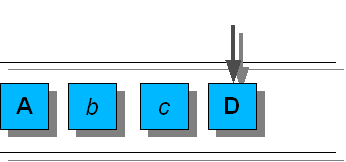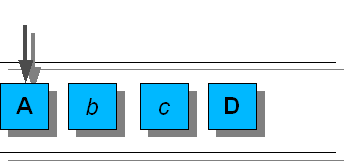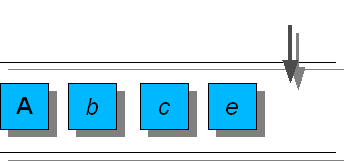- java.lang.Object
-
- javax.swing.undo.AbstractUndoableEdit
-
- javax.swing.undo.CompoundEdit
-
- javax.swing.undo.UndoManager
-
- All Implemented Interfaces:
- Serializable, EventListener, UndoableEditListener, UndoableEdit
public class UndoManager extends CompoundEdit implements UndoableEditListener
UndoManagermanages a list ofUndoableEdits, providing a way to undo or redo the appropriate edits. There are two ways to add edits to anUndoManager. Add the edit directly using theaddEditmethod, or add theUndoManagerto a bean that supportsUndoableEditListener. The following examples creates anUndoManagerand adds it as anUndoableEditListenerto aJTextField:UndoManager undoManager = new UndoManager(); JTextField tf = ...; tf.getDocument().addUndoableEditListener(undoManager);
UndoManagermaintains an ordered list of edits and the index of the next edit in that list. The index of the next edit is either the size of the current list of edits, or ifundohas been invoked it corresponds to the index of the last significant edit that was undone. Whenundois invoked all edits from the index of the next edit to the last significant edit are undone, in reverse order. For example, consider anUndoManagerconsisting of the following edits: A b c D. Edits with a upper-case letter in bold are significant, those in lower-case and italicized are insignificant.
Figure 1 As shown in figure 1, if D was just added, the index of the next edit will be 4. Invoking
undoresults in invokingundoon D and setting the index of the next edit to 3 (edit c), as shown in the following figure.
Figure 2 The last significant edit is A, so that invoking
undoagain invokesundoon c, b, and A, in that order, setting the index of the next edit to 0, as shown in the following figure.
Figure 3 Invoking
redoresults in invokingredoon all edits between the index of the next edit and the next significant edit (or the end of the list). Continuing with the previous example ifredowere invoked,redowould in turn be invoked on A, b and c. In addition the index of the next edit is set to 3 (as shown in figure 2).Adding an edit to an
UndoManagerresults in removing all edits from the index of the next edit to the end of the list. Continuing with the previous example, if a new edit, e, is added the edit D is removed from the list (after havingdieinvoked on it). If c is not incorporated by the next edit (c.addEdit(e)returns true), or replaced by it (e.replaceEdit(c)returns true), the new edit is added after c, as shown in the following figure.
Figure 4 Once
endhas been invoked on anUndoManagerthe superclass behavior is used for allUndoableEditmethods. Refer toCompoundEditfor more details on its behavior.Unlike the rest of Swing, this class is thread safe.
Warning: Serialized objects of this class will not be compatible with future Swing releases. The current serialization support is appropriate for short term storage or RMI between applications running the same version of Swing. As of 1.4, support for long term storage of all JavaBeans™ has been added to the
java.beanspackage. Please seeXMLEncoder.
-
-
Field Summary
-
Fields inherited from class javax.swing.undo.CompoundEdit
edits
-
Fields inherited from class javax.swing.undo.AbstractUndoableEdit
RedoName, UndoName
-
-
Constructor Summary
Constructors Constructor and Description UndoManager()Creates a newUndoManager.
-
Method Summary
All Methods Instance Methods Concrete Methods Modifier and Type Method and Description booleanaddEdit(UndoableEdit anEdit)Adds anUndoableEditto thisUndoManager, if it's possible.booleancanRedo()Returns true if edits may be redone.booleancanUndo()Returns true if edits may be undone.booleancanUndoOrRedo()Returns true if it is possible to invokeundoorredo.voiddiscardAllEdits()Empties the undo manager sending each edit adiemessage in the process.protected UndoableEditeditToBeRedone()Returns the next significant edit to be redone ifredois invoked.protected UndoableEditeditToBeUndone()Returns the next significant edit to be undone ifundois invoked.voidend()Turns thisUndoManagerinto a normalCompoundEdit.intgetLimit()Returns the maximum number of edits thisUndoManagerholds.StringgetRedoPresentationName()Returns a description of the redoable form of this edit.StringgetUndoOrRedoPresentationName()Convenience method that returns eithergetUndoPresentationNameorgetRedoPresentationName.StringgetUndoPresentationName()Returns a description of the undoable form of this edit.voidredo()Redoes the appropriate edits.protected voidredoTo(UndoableEdit edit)Redoes all changes from the index of the next edit toedit, updating the index of the next edit appropriately.voidsetLimit(int l)Sets the maximum number of edits thisUndoManagerholds.StringtoString()Returns a string that displays and identifies this object's properties.protected voidtrimEdits(int from, int to)Removes edits in the specified range.protected voidtrimForLimit()Reduces the number of queued edits to a range of size limit, centered on the index of the next edit.voidundo()Undoes the appropriate edits.voidundoableEditHappened(UndoableEditEvent e)AnUndoableEditListenermethod.voidundoOrRedo()Convenience method that invokes one ofundoorredo.protected voidundoTo(UndoableEdit edit)Undoes all changes from the index of the next edit toedit, updating the index of the next edit appropriately.-
Methods inherited from class javax.swing.undo.CompoundEdit
die, getPresentationName, isInProgress, isSignificant, lastEdit
-
Methods inherited from class javax.swing.undo.AbstractUndoableEdit
replaceEdit
-
-
-
-
Method Detail
-
getLimit
public int getLimit()
Returns the maximum number of edits thisUndoManagerholds. A value less than 0 indicates the number of edits is not limited.- Returns:
- the maximum number of edits this
UndoManagerholds - See Also:
addEdit(javax.swing.undo.UndoableEdit),setLimit(int)
-
discardAllEdits
public void discardAllEdits()
Empties the undo manager sending each edit adiemessage in the process.- See Also:
AbstractUndoableEdit.die()
-
trimForLimit
protected void trimForLimit()
Reduces the number of queued edits to a range of size limit, centered on the index of the next edit.
-
trimEdits
protected void trimEdits(int from, int to)Removes edits in the specified range. All edits in the given range (inclusive, and in reverse order) will havedieinvoked on them and are removed from the list of edits. This has no effect iffrom>to.- Parameters:
from- the minimum index to removeto- the maximum index to remove
-
setLimit
public void setLimit(int l)
Sets the maximum number of edits thisUndoManagerholds. A value less than 0 indicates the number of edits is not limited. If edits need to be discarded to shrink the limit,diewill be invoked on them in the reverse order they were added. The default is 100.- Parameters:
l- the new limit- Throws:
RuntimeException- if thisUndoManageris not in progress (endhas been invoked)- See Also:
CompoundEdit.isInProgress(),end(),addEdit(javax.swing.undo.UndoableEdit),getLimit()
-
editToBeUndone
protected UndoableEdit editToBeUndone()
Returns the next significant edit to be undone ifundois invoked. This returnsnullif there are no edits to be undone.- Returns:
- the next significant edit to be undone
-
editToBeRedone
protected UndoableEdit editToBeRedone()
Returns the next significant edit to be redone ifredois invoked. This returnsnullif there are no edits to be redone.- Returns:
- the next significant edit to be redone
-
undoTo
protected void undoTo(UndoableEdit edit) throws CannotUndoException
Undoes all changes from the index of the next edit toedit, updating the index of the next edit appropriately.- Parameters:
edit- the edit to be undo to- Throws:
CannotUndoException- if one of the edits throwsCannotUndoException
-
redoTo
protected void redoTo(UndoableEdit edit) throws CannotRedoException
Redoes all changes from the index of the next edit toedit, updating the index of the next edit appropriately.- Parameters:
edit- the edit to be redo to- Throws:
CannotRedoException- if one of the edits throwsCannotRedoException
-
undoOrRedo
public void undoOrRedo() throws CannotRedoException, CannotUndoExceptionConvenience method that invokes one ofundoorredo. If any edits have been undone (the index of the next edit is less than the length of the edits list) this invokesredo, otherwise it invokesundo.- Throws:
CannotUndoException- if one of the edits throwsCannotUndoExceptionCannotRedoException- if one of the edits throwsCannotRedoException- See Also:
canUndoOrRedo(),getUndoOrRedoPresentationName()
-
canUndoOrRedo
public boolean canUndoOrRedo()
Returns true if it is possible to invokeundoorredo.- Returns:
- true if invoking
canUndoOrRedois valid - See Also:
undoOrRedo()
-
undo
public void undo() throws CannotUndoExceptionUndoes the appropriate edits. Ifendhas been invoked this calls through to the superclass, otherwise this invokesundoon all edits between the index of the next edit and the last significant edit, updating the index of the next edit appropriately.- Specified by:
undoin interfaceUndoableEdit- Overrides:
undoin classCompoundEdit- Throws:
CannotUndoException- if one of the edits throwsCannotUndoExceptionor there are no edits to be undone- See Also:
CompoundEdit.end(),canUndo(),editToBeUndone()
-
canUndo
public boolean canUndo()
Returns true if edits may be undone. Ifendhas been invoked, this returns the value from super. Otherwise this returns true if there are any edits to be undone (editToBeUndonereturns non-null).- Specified by:
canUndoin interfaceUndoableEdit- Overrides:
canUndoin classCompoundEdit- Returns:
- true if there are edits to be undone
- See Also:
CompoundEdit.canUndo(),editToBeUndone()
-
redo
public void redo() throws CannotRedoExceptionRedoes the appropriate edits. Ifendhas been invoked this calls through to the superclass. Otherwise this invokesredoon all edits between the index of the next edit and the next significant edit, updating the index of the next edit appropriately.- Specified by:
redoin interfaceUndoableEdit- Overrides:
redoin classCompoundEdit- Throws:
CannotRedoException- if one of the edits throwsCannotRedoExceptionor there are no edits to be redone- See Also:
CompoundEdit.end(),canRedo(),editToBeRedone()
-
canRedo
public boolean canRedo()
Returns true if edits may be redone. Ifendhas been invoked, this returns the value from super. Otherwise, this returns true if there are any edits to be redone (editToBeRedonereturns non-null).- Specified by:
canRedoin interfaceUndoableEdit- Overrides:
canRedoin classCompoundEdit- Returns:
- true if there are edits to be redone
- See Also:
CompoundEdit.canRedo(),editToBeRedone()
-
addEdit
public boolean addEdit(UndoableEdit anEdit)
Adds anUndoableEditto thisUndoManager, if it's possible. This removes all edits from the index of the next edit to the end of the edits list. Ifendhas been invoked the edit is not added andfalseis returned. Ifendhasn't been invoked this returnstrue.- Specified by:
addEditin interfaceUndoableEdit- Overrides:
addEditin classCompoundEdit- Parameters:
anEdit- the edit to be added- Returns:
- true if
anEditcan be incorporated into this edit - See Also:
CompoundEdit.end(),CompoundEdit.addEdit(javax.swing.undo.UndoableEdit)
-
end
public void end()
Turns thisUndoManagerinto a normalCompoundEdit. This removes all edits that have been undone.- Overrides:
endin classCompoundEdit- See Also:
CompoundEdit.end()
-
getUndoOrRedoPresentationName
public String getUndoOrRedoPresentationName()
Convenience method that returns eithergetUndoPresentationNameorgetRedoPresentationName. If the index of the next edit equals the size of the edits list,getUndoPresentationNameis returned, otherwisegetRedoPresentationNameis returned.- Returns:
- undo or redo name
-
getUndoPresentationName
public String getUndoPresentationName()
Returns a description of the undoable form of this edit. Ifendhas been invoked this calls into super. Otherwise if there are edits to be undone, this returns the value from the next significant edit that will be undone. If there are no edits to be undone andendhas not been invoked this returns the value from theUIManagerproperty "AbstractUndoableEdit.undoText".- Specified by:
getUndoPresentationNamein interfaceUndoableEdit- Overrides:
getUndoPresentationNamein classCompoundEdit- Returns:
- a description of the undoable form of this edit
- See Also:
undo(),CompoundEdit.getUndoPresentationName()
-
getRedoPresentationName
public String getRedoPresentationName()
Returns a description of the redoable form of this edit. Ifendhas been invoked this calls into super. Otherwise if there are edits to be redone, this returns the value from the next significant edit that will be redone. If there are no edits to be redone andendhas not been invoked this returns the value from theUIManagerproperty "AbstractUndoableEdit.redoText".- Specified by:
getRedoPresentationNamein interfaceUndoableEdit- Overrides:
getRedoPresentationNamein classCompoundEdit- Returns:
- a description of the redoable form of this edit
- See Also:
redo(),CompoundEdit.getRedoPresentationName()
-
undoableEditHappened
public void undoableEditHappened(UndoableEditEvent e)
AnUndoableEditListenermethod. This invokesaddEditwithe.getEdit().- Specified by:
undoableEditHappenedin interfaceUndoableEditListener- Parameters:
e- theUndoableEditEventtheUndoableEditEventwill be added from- See Also:
addEdit(javax.swing.undo.UndoableEdit)
-
toString
public String toString()
Returns a string that displays and identifies this object's properties.- Overrides:
toStringin classCompoundEdit- Returns:
- a String representation of this object
-
-